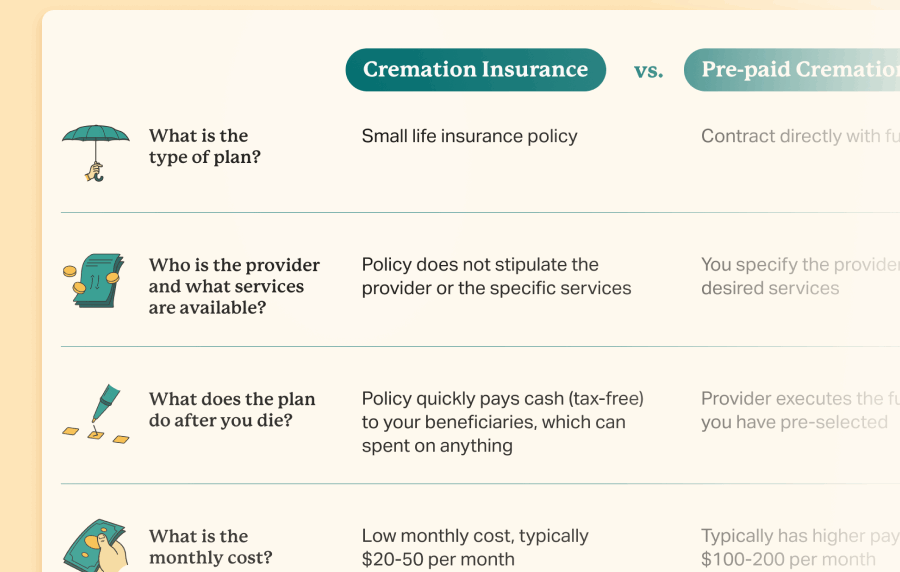Life Insurance Age Limit Overview
| Policy Type | New Applicant Age Limit | How Long The Coverage Lasts |
|---|---|---|
| Final Expense Insurance | 90 | Forever |
| Guaranteed Acceptance | 85 | Forever |
| Term Life Insurance | 80 | Until age 80-90 |
| Traditional Whole Life Insurance | 85 | Forever |
| Universal Life Insurance | 85 | Forever* |
| *A UL policy can last forever but may terminate if you withdraw too much cash value or fail to make sufficient premium payments. | ||
Final Expense Insurance Age Limit
- Age limit for new applicants: 90
- How long the policy lasts: Forever
Final expense life insurance, also known as burial insurance or funeral insurance, is a type of no medical exam whole life insurance meant to pay for your end-of-life costs.
Burial insurance has no age limit and will last forever. The coverage is generally less than $50,000, and the underwriting is very lenient, meaning seniors with pre-existing conditions are still eligible.
Even though these policies are primarily meant for funeral costs, the payout money can technically be spent on anything, including medical bills, credit card debts, or anything else.
For people over 85, burial insurance is the only type of coverage available.
Guaranteed Acceptance Life Insurance Age Limit
- Age limit for new applicants: 85
- How long the policy lasts: Forever
Guaranteed issue life insurance is a type of policy with no medical underwriting. You’re guaranteed approval because there are no health questions or medical exams to complete.
These policies always have a two-year waiting period. If you die during the waiting period, the insurance company will only refund your premiums plus approximately 10% interest.
Guaranteed acceptance plans are always a type of whole life insurance, so the coverage lasts your entire life.
Term Life Insurance Age Limit
- Age limit for new applicants: 80 (with a medical exam) | 75 (no medical exam)
- How long the policy lasts: Typically until age 80, 85, or 90
Term life insurance is a temporary policy that expires after a specific period. After you reach the end of the term, the policy terminates, and you no longer have insurance.
How long a term policy lasts depends on your age and the company. For example, most AARP life insurance policies are a term plan that expires at age 80, and you must be 50-74 to buy it.
Traditional Whole Life Insurance Age Limit
- Age limit for new applicants: 85 (with a medical exam) | 80 (no medical exam)
- How long the policy lasts: Forever
Whole life insurance is a type of permanent life insurance with ironclad guarantees. The premiums cannot increase, the coverage can’t decrease, and it lasts forever. It will also build cash value that you can withdraw and spend as you please.
You’ll have to take a medical exam to get a new policy between 81-85. No exam whole life insurance options are only available to those aged 80 and below.
Universal Life Insurance Age Limit
- Age limit for new applicants: 85 (with a medical exam) | 80 (no medical exam)
- How long the policy lasts: Forever
Universal life is a form of permanent life insurance with flexible premiums and cash value accumulation.
You’ll have to take a medical exam to get a new policy between age 81 and 85. At age 80 and younger, there are many no-exam options.
Frequently Asked Questions
If you don’t have insurance to pay for a burial, you can crowdfund through sites like GoFundMe, do fundraisers such as a car wash, or pool funds together as a family. Also, you can borrow money from a lending institution, ask a funeral home if you can set up a payment plan, or see if your local or state government has any indigent burial programs. Only a few states offer burial assistance through Medicaid. Without insurance, paying for a funeral is going to be a strain on your family, which is why it’s so important to plan ahead.
Funeral insurance for seniors is usually the best type of life insurance for older adults because paying for funeral costs is generally all that is needed.
Many life insurance companies offer life insurance to seniors over 80. The only types available are burial insurance, whole life, and universal life. If you’re exactly 80 years old, you might qualify for a 10-year term (nothing longer). After age 81, companies will no longer offer term life insurance.
Very few companies sell life insurance over 85, but it is possible. Whole life final expense insurance is the only option. There is no term, traditional whole life, or universal life available. To qualify at this age, you won’t have to take a medical exam, but you will have to answer health questions. There are no guaranteed acceptance life insurance options after age 85.
- Nationally licensed life insurance agent with over 16 years of experience
- Personal annual production that puts him in the top .001% out of all life insurance agents in the nation.
Anthony Martin is a nationally licensed insurance expert with over 16 years of experience and has personally served over 10,000 clients with their life insurance needs. He frequently authors entrepreneurial and life insurance content for Forbes, Inc.com, Newsweek, Kiplinger, and Entreprenuer.com. Anthony has been consulted as an expert life insurance source for dozens of high-profile websites such as Forbes, Bankrate, Reuters, Fox Business, CNBC, Investopedia, Insurance.com, Yahoo Finance, and many more.
- Nationally licensed life insurance agent with over 20 years of experience
- Best selling Amazon author.
Jeff Root is a nationally licensed life insurance expert with over 20 years of experience. He has personally helped over 3000 clients with their life insurance needs. Jeff is a best-selling Amazon author and the managing partner of a highly successful insurance brokerage that manages over 2,500 licensed insurance agents across the USA. He has been a featured life insurance source for prestigious websites such as Forbes, Bloomberg, MarketWatch, Nerdwallet, and many more.
- Nationally licensed life insurance agent with over 15 years of experience
- Best selling Amazon author of five insurance sales books.
David Duford is a nationally licensed insurance expert with over 15 years of experience. He has personally helped more than 15,000 clients buy life insurance. David has been featured as an expert source for highly authoritative publications such as A.M. Best and Insurancenewsnet. He also runs one of the largest Youtube channels to help aspiring insurance agents serve their clients better.
- Nationally licensed life insurance agent with over 20 years of experience
- Best selling Amazon author.
Jeff Root is a nationally licensed life insurance expert with over 20 years of experience. He has personally helped over 3000 clients with their life insurance needs. Jeff is a best-selling Amazon author and the managing partner of a highly successful insurance brokerage that manages over 2,500 licensed insurance agents across the USA. He has been a featured life insurance source for prestigious websites such as Forbes, Bloomberg, MarketWatch, Nerdwallet, and many more.
- Nationally licensed life insurance agent with over 15 years of experience
- Best selling Amazon author of five insurance sales books.
David Duford is a nationally licensed insurance expert with over 15 years of experience. He has personally helped more than 15,000 clients buy life insurance. David has been featured as an expert source for highly authoritative publications such as A.M. Best and Insurancenewsnet. He also runs one of the largest Youtube channels to help aspiring insurance agents serve their clients better.
Choice Mutual often cites third-party websites to provide context and verification for specific claims made in our work. We only link to authoritative websites that provide accurate information. You can learn more about our editorial standards, which guide our mission of delivering factual and impartial content.
-
GoFundMe. https://www.gofundme.com/
-
borrow money. https://www.lendingtree.com/personal/funeral-loans/
-
indigent burial. https://www.us-funerals.com/indigent-burials-and-cremations/








